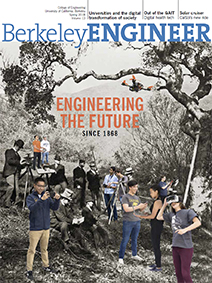Fighting human trafficking
Human traffickers commonly post online ads selling sex, but they are often difficult for law enforcement to trace. Now, Berkeley computer science Ph.D. candidate Rebecca Portnoff, working with researchers from UC San Diego and New York University, has developed the first automated techniques to link ads to bitcoin, the leading payment method for online sex ads, and potentially identify those ads tied to human trafficking rings. The research team’s approach used two novel algorithms. The first is a machine-learning algorithm that identifies separate ads for different sex workers that share a single author, a potential sign of a trafficking ring. The second algorithm takes publicly available information from bitcoin and compares payment timestamps with timestamps of the ads’ appearance. The researchers tested these techniques on a sampling of 10,000 real sex ads and reported an 89 percent true-positive rate for grouping ads by author — significantly more accurate than current algorithms — as well as a high rate of linking ads to bitcoin transactions. The researchers plan to work with law enforcement and nonprofit organizations to further refine their analysis.

